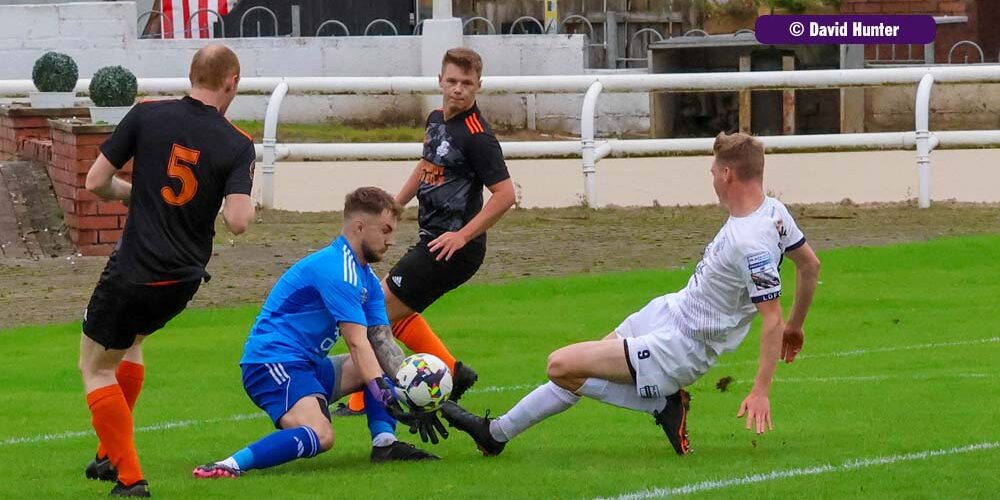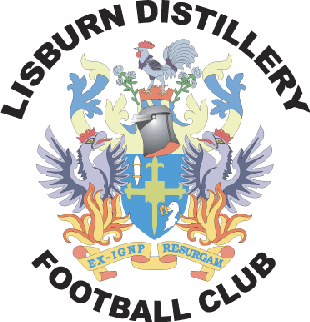Distillery Football Club was formed in November 1880 with the club playing its first match on 20th November 1880 – a one-nil victory over Dundela – at Daisy Hill, Roden Street, Belfast. In 1882 it moved to a new ground at Broadway, Belfast and won its first trophy, the Irish Cup, in 1884 defeating Wellington Park 5-0 in the final. The club went on to win the Cup three times in a row and on 28th October 1887 achieved its highest ever victory, an 18-0 win over United Steamship. The club went on to establish itself as one of the Irish League’s top sides for the next few decades with success in both cup and league competitions.
 1915/16 Distillery team pictured at Grosvenor Park |
 Grosvenor Park pictured from above (late 60’s) |
1932 saw the setting of a new club record that still stands to this day, the most goals scored by a player. The player was Sam “Bull” McAdam, who in his Distillery career scored a total of 226 goals. During the Second World War many international players guested for the club and then in 1950 Distillery created more history by not only being the first team in Ireland to install floodlights, but also by being the first club in the British Isles to hold a competitive match under floodlights .

Jackie Curry and Derek Dougan at Grosvenor Park in 1957
In 1963 it won the Irish League and its reward was a European League Champions Cup draw against former European champions Benfica. In a dramatic home game Distillery held its mighty opposition to a 3-3 draw before losing the second-leg in Lisbon. Then in 1970 the club was rewarded for winning the Irish Cup with games against Barcelona in the European Cup Winners Cup. Sadly also in 1970, due to civil disturbances in Northern Ireland at the time, Distillery was forced to leave its home at Grosvenor Park and spent the next 10 years without a ground, having to to survive on the generosity of other clubs such as Crusaders, and Brantwood who let the Whites ground-share with them.

Distillery captain Peter Rafferty and full back Derek Meldrum parade the Irish Cup round Windsor Park, after defeating Derry City 3-0 in the 1971 Irish Cup Final
In 1980 the club moved to its current home, New Grosvenor Stadium, at Lambeg near Lisburn and from that point it was able to start rebuilding again. The side returning to winning ways in 1985 winning the County Antrim Shield and in 1994 when it won the Gold Cup. In 1999 the club’s name was changed from Distillery to Lisburn Distillery.

Tony Coulter scores Distillery’s first goal at the New Grosvenor Stadium against Ards (1980)
In the early noughties the club entered one of the most successful playing eras in its history. It qualified for European football on no less than four occasions between 2003-09 although on one of those occasions (2003) the club was unable to compete due to deficiencies in its application. The club played FK Žalgiris (Lithuania – 2005) and TPS Turku (Finland – 2008) in the Intertoto Cup. In 2009 it played FC Zestafoni (Georgia) in the Europa League but sadly on each occasion the club was unable to get beyond the first round.
At the end of 2009 financial issues threatened the very existence of the club. However after the efforts of its supporters and the sale of New Grosvenor Stadium the club managed to survive though a greatly reduced income would mean more realistic ambitions playing-wise. It was no surprise that the spectre of relegation loomed large in 2009/10 when the club found itself 13 points adrift at the foot of the Irish Premiership table. Few would have believed what would then happen – but under the management of recently appointed manager Tommy Wright, the club mounted what is known in its history as “The Great Escape” with an unbeaten run in its last 11 league games. The club eventually finished eight points clear of the drop zone. Wright’s remarkable transformation of the club continued the next season as the club defied the odds again and won the CIS Insurance Cup when it defeated Portadown 2-1 in a televised final.

Tommy Wright lifts the CIS League Cup, after having defeated Portadown 2-1
Tommy Wright then moved on to St Johnstone and the club survived a play-off the following season. In February 2012 the club sold its’ New Grosvenor ground to meet debts and the subsequent financial restraints meant the club struggled to attract the top players. After an awful season the club was relegated to Championship 1 in April 2013.
Relegation then occurred again in 2016, when the Whites were relegated from the Championship into the newly formed Premier Intermediate League.
Colin McIlwaine and George O’Boyle were appointed in the summer of 2016, and had to rebuild the entire squad. They finished 9th that season and followed up with two good years achieving 4th place in both before they moved on.
The curtailed 2019/20 season under Stephen Hatfield stopped with the team in 7th spot. Former player, Johnny Clapham replaced him at the start of the 2020/21 season.

